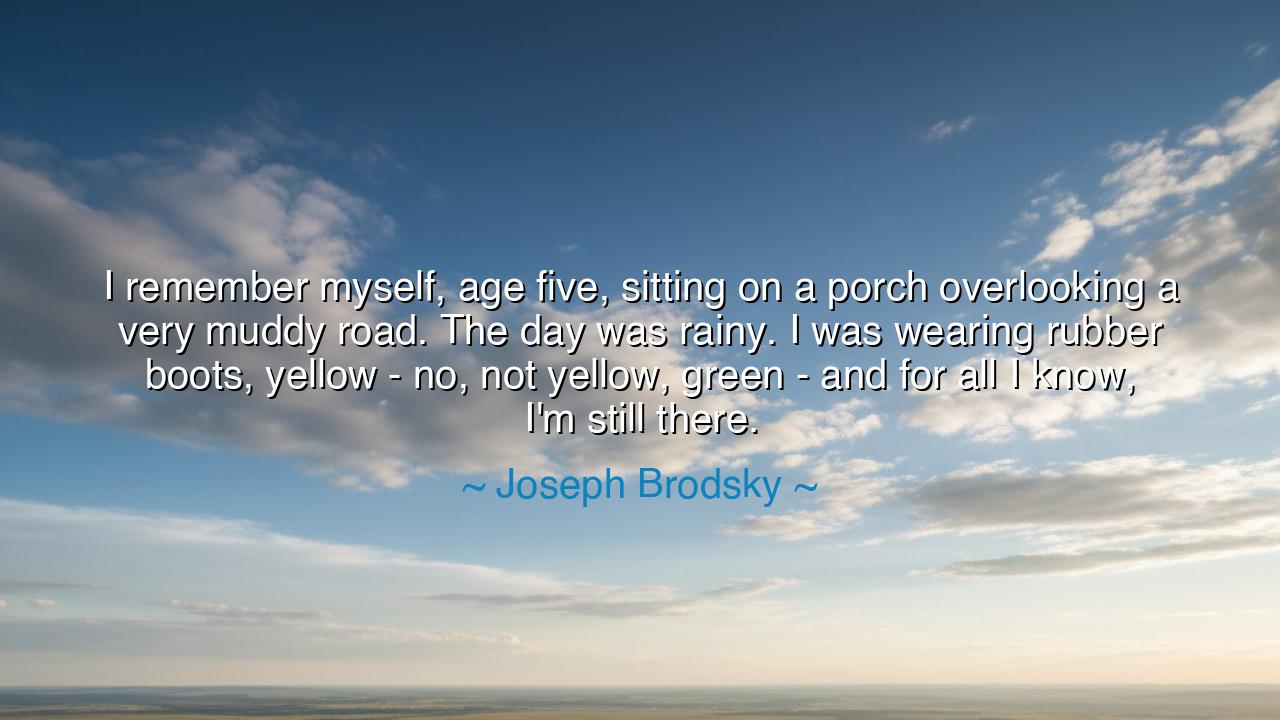
I remember myself, age five, sitting on a porch overlooking a
I remember myself, age five, sitting on a porch overlooking a very muddy road. The day was rainy. I was wearing rubber boots, yellow - no, not yellow, green - and for all I know, I'm still there.






When Joseph Brodsky said, “I remember myself, age five, sitting on a porch overlooking a very muddy road. The day was rainy. I was wearing rubber boots, yellow — no, not yellow, green — and for all I know, I'm still there,” he was not merely recalling a childhood memory; he was revealing the eternal echo of the self, that part of us which remains unchanged across the long passage of time. The image he paints — a small boy, the rain, the mud, the confusion between yellow and green — is not about the details, but about the stillness of memory, the persistence of consciousness. It is a confession that within every man, no matter how learned or aged, there remains the child who first looked upon the world in wonder.
In these words, Brodsky, the exiled poet and philosopher, contemplates the strange constancy of identity. Life, he suggests, may layer us with experiences, hardships, and wisdom, yet beneath all of it remains that first observer — the five-year-old self, sitting in silence, seeing the world as something vast and unknowable. When he says, “for all I know, I’m still there,” he acknowledges that though his body has aged and his circumstances changed, part of his soul has never left that moment. It is as if time has moved around him, while he himself, in essence, remains still.
The ancients understood this truth well. The Greeks spoke of the daimon, the inner companion that travels with each person from birth to death, unchanged by age or circumstance. The Romans called it the genius, the guardian spirit of identity. Brodsky’s quote carries this same sacred idea: that each human being carries within them a timeless core — the self that neither triumph nor tragedy can alter. The boy in the rain is not just a memory; he is the anchor of the soul, the witness of one’s own becoming.
Think of Leonardo da Vinci, who as a child stared at the flow of water and saw in it the secrets of motion and form. That same wonder guided his hand all his life — through invention, painting, and study. The child’s curiosity never left him; it became the foundation of his genius. So too with Brodsky, who spent much of his life in exile, torn from his homeland, yet found in the solitude of memory a place of belonging. The porch, the rain, the boots — these are symbols of origin, the eternal return to the moment where the soul first recognized itself as alive.
The origin of Brodsky’s quote lies in his meditations on memory and time — the themes that pervade his poetry and prose. Having lived through displacement, censorship, and the loneliness of exile, he came to see that the past is not something we leave behind but something we carry forward. The porch is not simply a place in childhood; it is the threshold between innocence and awareness, between the world as seen and the world as understood. When he says he may still be there, he means that all of life may be nothing more than the unfolding of that first act of observation — a lifelong continuation of that first moment of stillness.
In this sense, his words are both melancholic and wise. They remind us that no matter how far we travel, we remain bound to our beginnings. The people we become are but extensions of the child who first wondered at rain and mud, who first felt the strange mixture of beauty and sadness that is life. The poet invites us to look backward not with regret, but with reverence — to recognize that the seed of everything we are was planted long ago in the quiet garden of our earliest memories.
Let this, then, be the teaching: do not forget the child within you, for that child is the purest form of your being. When the world grows loud, when duties multiply and hope seems distant, return to that inner porch. Remember what it was to sit and simply see. Reward the stillness that taught you how to wonder. In every adult who feels weary, the five-year-old still waits — not lost, but watching, patient and eternal.
And so, as Brodsky reminds us, though we move forward in years, part of us never leaves that place of beginning. The self that wonders remains forever untouched by time. Cherish it, speak to it, listen to it — for it is both your first teacher and your last companion, the timeless witness of your soul.






AAdministratorAdministrator
Welcome, honored guests. Please leave a comment, we will respond soon